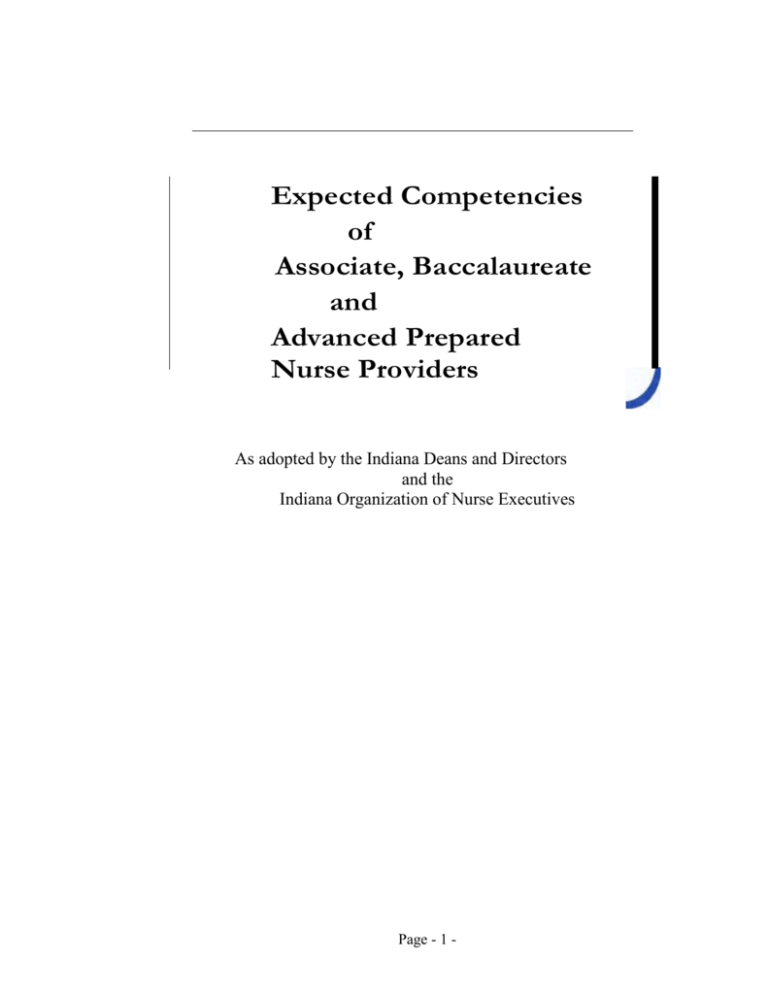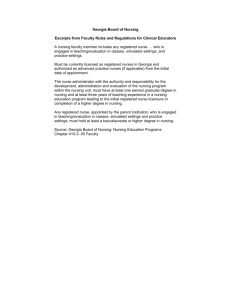Expected Competencies of Associate, Baccalaureate and Advanced
advertisement

Expected Competencies of Associate, Baccalaureate and Advanced Prepared Nurse Providers As adopted by the Indiana Deans and Directors and the Indiana Organization of Nurse Executives Page - 1 - Preamble The following competencies reflect the collective work of representatives from nursing education and nursing service. This three-year collaborative effort sought to address the effective of the changing health care environment on nursing practice. Through open dialogue between practice and education representatives, it became apparent that there was a need to identify the depth and breadth of knowledge and skills necessary to meet the changing demands placed on practice. As the discussion evolved, it became clear that the different levels of educational preparation needed to be recognized in defining the scope of skills and knowledge graduates bring to the work place. First, the baccalaureate competencies were articulated, then the associate and advance practice competencies were formulated, using the baccalaureate competencies as the basis of differentiation. The primary purpose of this document is to facilitate common understandings of the goals of education for their subsequent use in practice. The work is conceived as a cornerstone to comprehensive discussions and debates through various partnerships of nursing practice and education that will energize the transition of nursing in Indiana into the next century. *Developed by the State Deans and Directors and the Indiana Organization of Nurse Executives. Approved by Nursing 2000 and Indiana State Nurses Association. (Update 6/10/98) It is expected in tomorrow's health care environment that three levels of nursing practice will be required to accommodate the depth and breadth of nursing practice. The scope of these essential levels of practice will be defined by the knowledge base required within each envisioned practice arena, the needs of particular care settings and the roles nurses are expected to assume in order to achieve therapeutic client outcomes across the spectrum of care. While it is recognized that nurses will be functioning in roles where expectations are inconsistent with the educational preparation noted here, there are ever expanding opportunities for educational enhancement and advancement. Associate Prepared Nurse (2 Years Post Graduation) The education experience embraces a circumscribed body of knowledge and skills necessary to provide direct care to individuals in various structured and semi-structured settings within the continuum of health care. The educational process emphasizes facts, principle, and concepts that serve as the basis for care decisions within a culturally sensitive care environment. 1. Conducts care assessments and interprets physical, functional, psycho-social, spiritual and environmental factors with input from or collaboration with other members of the health care team. 2. Plans care in collaboration with other members of the health care team that is need driven for a specific population related to an episode of care: a. individualizes care pathways for specified individuals or groups in specific settings b. sets therapeutic care goals in collaboration with client, families and other members of the health care team; and c. incorporates client's lifestyle, cultural beliefs, health behaviors and support systems in setting care goals. 3. Gives direct care in collaboration with clients, families and other members of the health care team in order to achieve therapeutic outcomes: a. uses state-of-the-art knowledge and technology in planning care for a specified group of clients for specific episodes of care; Page - 2 - b. c. communicates client behaviors and responses to therapeutic interventions clearly, concisely, and accurately; makes appropriate judgments about discharge needs. 4. Provides competent care to achieve agreed upon care outcomes: a. shares information with multidisciplinary team members; b. performs and evaluates technical aspects of care; c. educates clients and families about recurring health problems and related symptoms; d. delegates specified routine technical functions to ancillary personnel; and e. assumes responsibility and accountability for own actions and those actions delegated to others. 5. Evaluates the effect of therapeutic interventions in relation to specified care outcomes and revises care as needed in collaboration with the client, family and other members of the health care team. 6. Provides input into the resolution of conflicts that result from client care or organizational issues. 7. Adopts a consumer oriented approach in the organization and delivery of cost-effective care for specified groups that result in positive client outcomes. 8. Assumes an active role as a member of the multidisciplinary care team in the evaluation and modification of client care practices and policies for specified groups. Baccalaureate Prepared Nurse (2 years post graduation) The education experience includes all aspects of established and emerging knowledge and skills core to the discipline and practice of nursing. Central to learning is the development of inq uire skills, the ability for abstract thinking, analyzing ambiguities, setting priorities and presenting logical arguments within a culturally sensitive care environment reflective of a pluralistic society. 1. Conducts and interprets findings of physical, functional, psycho-social, spiritual, cultural sensitivity, and environmental assessments to determine care needs and constraints in meeting these needs. 2. Integrates assessment components across the continuum of care: a. appropriately interprets data obtained from nursing assessment, medical assessments/documentation and diagnostic and procedural findings; b. identifies care needs jointly with individuals, families, communities and other members of the health care team; and c. negotiates and manages care to achieve need-driven/resource outcomes. 3. Plans and manages care collaboratively with individuals, families, communities, and other members of the health care team in order to achieve therapeutic outcomes in order to achieve therapeutic outcomes: a. prioritizes established therapeutic goals; b. identifies therapeutic interventions consistent with established goals (teaching/coaching, functional, somatic and emotional interventions); c. uses state-of-the-art knowledge and technology in planning care; d. articulates nursing judgments and nursing therapeutics (verbally and in writing) and communicates rationale for care decisions to other members of the health care team, individuals, families and communities; e. makes appropriate judgment about discharge needs and support services as individuals move across the health care continuum; f. develops programs to deal with common problems of vulnerable populations as appropriate primary prevention Page - 3 - 4. Provides competent care that achieves desired outcomes: a. coordinates/inputs information with multidisciplinary team members to enhance value driven outcomes (patient care, ethical, financial, etc.) at an affordable cost; b. performs and interprets results from technical aspects of care the require a baccalaureate nurse to perform; c. educates individuals, families, communities and other care givers about disease/illness, medical-technical aspects of care, symptom management, self-care management and resource management; d. delegates appropriate routine technical functions to non licensed and licensed personnel; and e. assumes responsibility for own actions and those actions delegated to others. 5. Evaluates client outcomes and revises plan of care as appropriate in collaboration with the client, family and other members of the health care team. 6. Negotiates with other health care team members to come to an acceptable resolution of conflicts resulting from client care issues or organizational issues. 7. Adopts a consumer oriented approach in the organization and delivery of cost-effective care for individuals, families, communities, physicians, and other users of providers resulting in positive client outcomes. Assumes a leadership role in guiding the multidisciplinary care team in evaluating and modifying client care practices and policies 8. a. b. c. d. embraces change and helps other members of the team work effectively in an ambiguous and changing environment, envisions opportunities for quality improvements; participates in activities to effect meaningful changes; uses state-of-the-art knowledge and technology to improve care practices/policies. Advanced Prepared Nurse* The educational experience begins at the graduate level by preparing nurses in specified areas of care expertise. Graduates gain skills in assessing, diagnosing and treating common health care problems for individuals and groups of clients within a culturally pluralistic society. The educational experience provides tools to shape the practice of nursing. 1. Uses advanced knowledge and skills to function independently and interdependently as a member of the health care to: a. conduct a comprehensive assessment that includes the physical, functional, psycho-social, cultural, and environmental aspects of health and wellness. b. differentiate between normal and abnormal findings among diverse populations; c. develop diagnoses independently or in collaboration with other health care team members; d. develop population-based profiles of patient/client needs that the design of population-based programs of care; e. integrate unique client needs into the development and implementation of best practice interventions to prevent unintended consequences and enhance intended care outcomes; f. incorporate measures in the plan of care that assess care outcomes; and g. use evaluation data to modify care. 2. Designs cost effective outcome measures based on best practice consistent with resources allocations of the health care setting and the diversity of the client care population being served. 3. Refers clients and family members, as appropriate to other provides and facilitates the movement of these clients across the health care continuum to maximize care outcomes. 4. Uses appropriate critical thinking skills in making independent, ethical decisions commensurate with the education, autonomy, authority, and ethical responsibility consistent with the advance practice role Page - 4 - a. b. provides consultation to other health care team members in the provision of competent care to individuals, families, and communities; and develops, coordinates or assures access to educational programs to enhance care outcomes. 5. Works with clients, families and other members of the health care team to articulate, interpret and ensure that identified therapeutic treatment regimens are carried out in a consistent fashion and evaluated according to established outcomes. 6. Initiates and/or participates in applicable clinical studies related to client needs, organizational issues and/or the health care delivery system. 7. Interprets health care issues/concerns and related economic consumer impact to public and private policy makers. 8. Applies research findings and state-of-the-art practice models to practice of nursing. 9. Develops policies involving health care issues. 10. Provides consultation for other health care workers on nursing practice issues. *For competencies to specific advanced practice nurses refer to standards of competencies by professional organization for each advance practice specialty Page - 5 -







